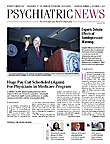As of March 27, 2015, all prescribers in the state of New York, with the exception of veterinarians, will be required to use an electronic prescribing system (e-prescribing) for all prescriptions.
The requirement is part of legislation, the Internet System for Tracking Overprescribing (I-STOP), approved in 2012.
Rachel Fernbach, J.D., deputy director and assistant general counsel for the New York State Psychiatric Association (NYSPA), explained that the I-STOP statute was approved in the wake of a quadruple homicide at a pharmacy in Long Island that set off alarms about the problem of addiction to pain killers. I-STOP requires anyone who is prescribing a controlled substance (Schedule II through Schedule V) to consult an online registry to determine if the patient is receiving the same or similar medications from another prescriber, which might indicate diversion or drug-seeking behavior.
But I-STOP also included a provision requiring all prescribers to adopt e-prescribing systems within two years of regulations being issued by the New York State Department of Health (DOH). Those regulations were issued in March 2013, so the mandatory e-prescribing requirement goes into effect next March.
Fernbach said that the DOH Bureau of Narcotic Enforcement has indicated that the March deadline will not be extended under any circumstances. The only exclusions from the requirement are prescriptions written by veterinarians or to be dispensed by pharmacies located outside of New York (including mail-order pharmacies). “The requirement includes all medications, controlled substances,and noncontrolled substances,” she told Psychiatric News.
There are exceptions for “temporary technological failure” and “adverse impact on a patient’s condition.” The latter refers to situations in which it is impractical for the patient to obtain an electronic prescription in a timely manner and in which a delay could adversely impact the patient’s medical condition or when a prescriber is legitimately unable to access his or her software application, such as when the prescriber is not near his or her office, out of town, or in an area without reliable Internet connections.
The statute says a waiver can be sought for three justifications: economic hardship, technological limitations not reasonably within the control of the practitioner, or other exceptional circumstances demonstrated by the provider. Applicants for a waiver must submit a sworn statement and detailed description of the circumstances; there is no formal application form, and if granted, the waiver is good for one year only but may be renewed.
To prepare psychiatrists for the law, Fernbach says the NYSPA has been offering in-person training and webinars on the subject. “So far we have trained approximately 1,000 psychiatrists on mandatory e-prescribing through both webinars and in-person lectures,” she said.
She noted as well that the NYSPA also recently held a vendor fair attended by several hundred psychiatrists and six electronic prescribing system vendors in the state. Those vendors are listed on the NYSPA website with information about their products and will participate in an upcoming webinar.
“At this time, we perceive no additional risk of malpractice action or liability arising from the use of electronic prescribing as long as clinicians adopt software that has been certified and meets federal requirements, use the software properly and according to its terms and conditions, and maintain the integrity of the security protocols,” Fernbach said.
But there are other concerns, such as when a pharmacy is out of stock of the prescribed medication. Fernbach explained that prescriptions for controlled substances may not be forwarded or transferred to another pharmacy, including between branches of the same national chain. “In this case, communication between provider, pharmacy, and patient will be necessary to select an alternative pharmacy,” she said. “The provider must then cancel the original prescription and issue a new one to the newly selected pharmacy. Providers should work with their software vendor to confirm the procedure for cancelling a prescription that has already been transmitted to a pharmacy. We understand this may be logistically difficult for some patients, as well as prescribers,” Fernbach said. “Right now, our best suggestion is trying to contact the pharmacy to confirm if a particular medication is available.” ■
More information on mandatory e-prescribing in New York can be accessed
here and on the NYSPsych
website.
